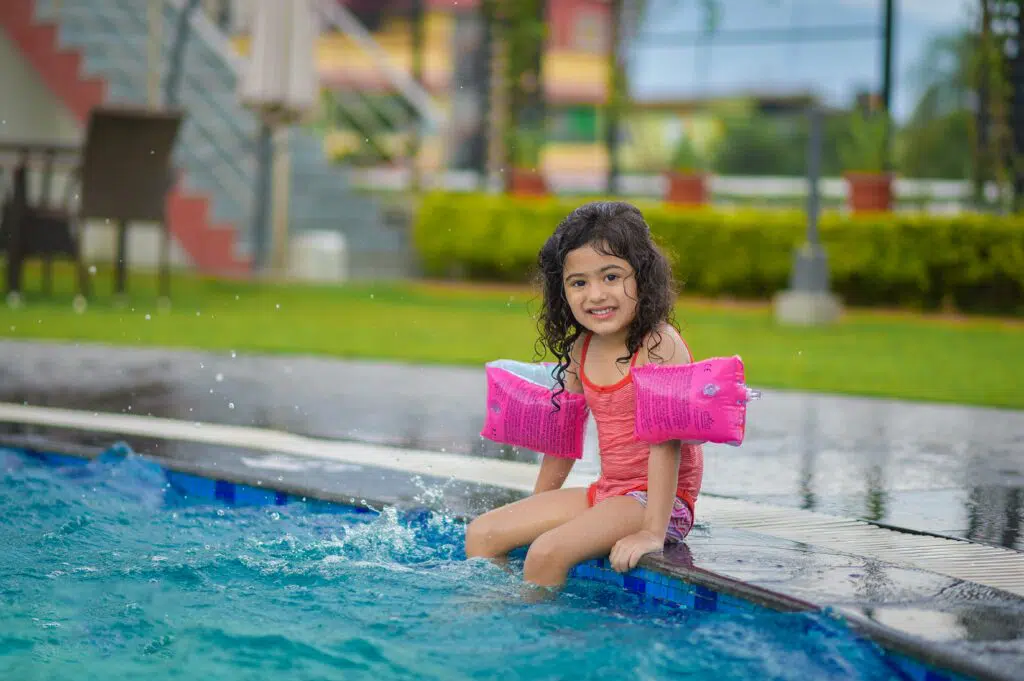Baby swimming sessions are part of aquatic activities to gently awaken the child but they do not teach them to swim as one might think. This is why some pools opt for the term “baby in the water” rather than “baby swimmer”.
At what age can he start this activity and what benefits will he get from it? How do the sessions take place? How to make baby feel safe? Dive into this article to discover the answers to these questions!
Whether it is to strengthen this bond between the baby and the water or take advantage of this educational moment to stimulate his development, baby swimming classes are favorable in many aspects and bring him new sensations. Of course, it is best to take a few precautions to fully enjoy this aquatic activity.
From 4 months to the age of 6, discovery sessions in the aquatic environment take place in small groups and at your child's pace at the municipal swimming pool in your city.
Prepare well for baby swimming lessons
Before starting baby swimming lessons, you will have to take the first compulsory vaccinations for your baby's health, including the DTP booster (diphtheria, tetanus, polio), to validate registration. In fact, you must provide the pool team with a medical certificate proving that your baby is up to date with his vaccinations and that he is fit for aquatic practice. If your baby suffers from or is prone to asthma, severe ear infections or chronic bronchitis, it is not recommended to enroll him in a baby swimming course. Do not hesitate to seek the advice of your doctor if you have any questions.
Registering your child as early as possible will allow them to get to grips with the aquatic environment and not fear it. The child can continue his sessions until he is 6 years old. Year during which he will be able to start swimming and swim like a real fish in water.
What are the benefits for baby?
The main benefits of baby swimming sessions are linked to the baby's senses:
- Your child will use senses which he is not usually used to using, because he is discovering water.
- This also allows the baby to understand water gently and gradually, without forcing it, which is even more beneficial for babies who are afraid of water.
- What is good about these baby swimming courses is that it contributes to the socializing your baby. He will be able to meet new children, this will allow him to make new friends.
- Baby will learn to know your body better, gain in autonomy and control his breathing when in water.
- These sessions also have benefits for you parents, you will be able to strengthen the bond you have with your little one.
What is the procedure for a baby swimming session?
The baby swimming sessions are designed to ensure that everything goes well: the water temperature, the duration of the lessons, etc. In fact, the water in the pool is heated between 32° and 35° so that the children's body heat remains relatively constant and high. As a general rule, lessons are never too long and last between 30 to 60 minutes depending on the age of your little one. Moreover, speaking of age, the sessions are open to babies between 4 months and 6 years old.
Lessons take place in small groups and in a shallow pool dedicated to baby swimming sessions or in the paddling pool. Naturally, you are with your little baby and pool instructors are there to help your children discover water (with an educational approach of course). You already suspect this, but there is no question of rushing, each baby goes at their own pace, performs the movements calmly and without pressure. During the session, your child will play several games to have fun alone, with you or with other children. Ultimately, the goal of these classes is for babies to become independent as they splash around in the water and grow.
Between 4 months and 1 year
Between 4 and 6 months, the baby will increase his contact with water outside of bath time. Around 6 months, the baby swimmer learns to stay seated in the water with the help of a mat and to move through the water towards us (a short distance) by instinctively practicing apnea. Parents and a swimming instructor are present to ensure the safety of the toddler.
Around a year
This age is linked to the fear of water. To remedy this, the sessions are in the form of games: the baby will be more comfortable and will overcome his fears. He will thus be able to have fun discovering new sensations.
Between 15 and 18 months
We introduce new elements to our baby swimmer: buoys, armbands and fries. The goal is to improve your balance with the help of these floats.
Around 2 years
The baby starts playing in the slides. In addition, this is the age when he begins to take his first dives... with the help of his parents to get his head out of the water.
Between 3 and 4 years old
Your toddler learns to do a few swims (or something similar) while keeping his head above water.
Between 5 and 6 years old
He tries to master the beginnings of swimming: breathing underwater, adequate movements, coordinated movements, etc. He is ready to become a great swimmer!
What equipment should you need for a baby swimmer?
Just as with any swimming lessons classic, it is important to prepare your child's bag well for their baby swimming session, it would be stupid to realize something was forgotten once on the road... This is why we have prepared a small list of the most important things for you. most important for your little bubbler:
- Obviously the swimsuit (some are disposable and have integrated diapers, but we prefer the more eco-friendly washable diaper swimsuits.
- A Bathing cap to protect your child's ears and head.
- A bath towel and a cleaning gel so that your baby comes out clean from their baby swimming class.
- A little to taste (or even a big one) to give baby some energy, because we all know that swimming pools are boring.
To keep your little one strong, it is best to give him slow sugars. Indeed, they will provide him with the energy necessary to splash around throughout the session.
Our advice so that the baby swimming session goes well
- Give your baby water before the session. This will prevent him from regurgitating if he drinks the cup.
- Consider taking pipettes of physiological saline in case the baby gets water in his eye.
- So that your child does not feel cold, you can take a bathrobe rather than a bath towel.
What if we gave ourselves some time?
Raising a child is not easy. It is important to make time for yourself. Aqua by is the ideal place for this. Our studios Aqua by have the largest Parisian pools dedicated to aquabiking and they open their doors to you!
Our courses, accessible to all, are supervised by motivating and caring coaches, in addition to being passionate with punchy music.
The lessons are collective and given by qualified and qualified coaches. The principle is simple: come only with your swimsuit, we take care of the rest! Our studios also have a sauna and a hammam to relax after each session and enjoy an incomparable well-being experience.
Charonne, Bastille, Réaumur and Boulogne… All you have to do is find the Aqua by studio closest to you!





